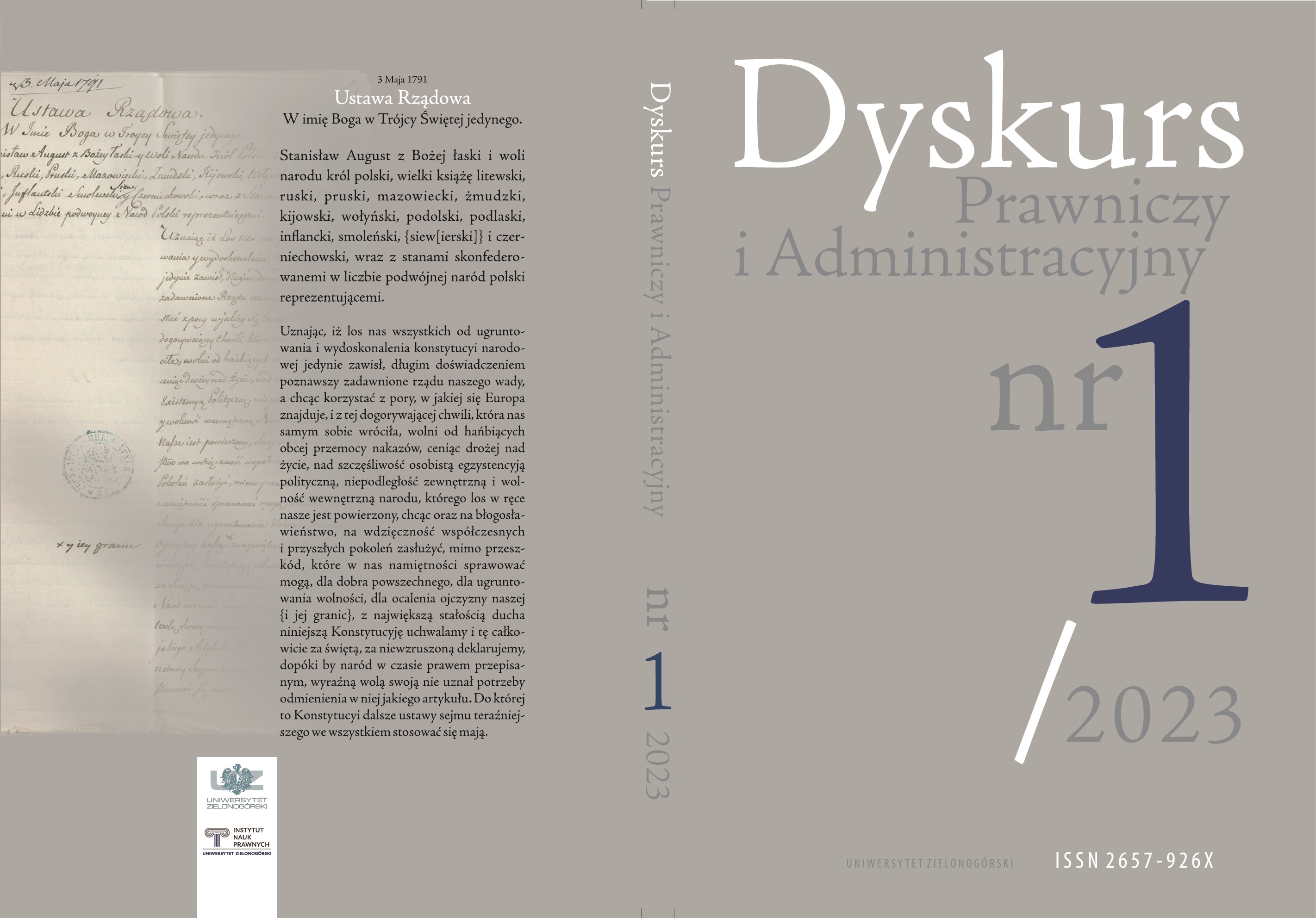Prawo narodów z perspektywy Trzeciego Świata
Słowa kluczowe:
prawo międzynarodowe, Trzeci Świat, historia, podmiotowość, prawa człowiekaAbstrakt
W artykule wskazano, że nauczanie prawa powinno nie tylko przygotowywać do praktycznego wykonywania zawodu, lecz także rozwijać wrażliwość humanisty, potrzebną każdemu prawnikowi. W przeciwnym wypadku społeczeństwo zostanie skazane na rzesze bezdusznie stosu jących prawo „farmaceutów”. Prawo międzynarodowe, jako przedmiot ogólnoinformujący, może peł nić szczególną rolę w rozwijaniu wrażliwości społecznej dzięki prezentowaniu różnych podejść, per spektyw teoretyczno-prawnych i filozoficznych. Jedną z propozycji jest ruch Third World Approaches to International Law, oferujący spojrzenie Trzeciego Świata (skupiającego ludy postkolonialne, na zywane też Południem) na prawo narodów. Materialistyczna wizja prawa międzynarodowego i jego historii widoczna w poglądach przedstawicieli TWAIL, proponująca krytyczne podejście do prawa, pokrewna z New Approaches to International La czy też Integrated Marxist Approach to International Law, może stanowić ciekawe uzupełnienie wykładów prawa narodów chociażby w zakresie jego hi storii, podmiotowości czy też praw człowieka, wychodzące nieco poza mainstreamowy nurt oparty na narracji naturalistycznej i pozytywistycznej.
Bibliografia
Alexandrowicz C.H., The Law of Nations in Global History, Oxford 2016.
Alvarez A., Latin America and International Law, „American Journal of International Law” 1909, vol. 3, z.2.
Anghie A., Fransisco de Vitoria and the Colonial Origins of International Law, „Social & Legal Studies” 1996, vol. 5(3).
Anghie A., Imperialism, Sovereignty and Making of International Law, Cambridge 2007.
Anghie A., The Evolution of International Law: Colonial and Postcolonial Realities, „Third World Quarterly” 2006, vol. 27, nr 5.
Balzer O., Nauka uniwersytecka a kolejność studiów w uniwersyteckiej nauce prawa, Warszawa 1921.
Cabaj J., Wpływ postmodernizmu na feministyczną teorię prawa, „Ius Novum” 2011, nr 2.
Carty A., Critical International Law: Recent Trends in the Theory of International Law, „European Journal of International Law” 1991, vol. 2.
Chimni B.S., International Law and World Order. A Critique of Contemporary Approaches, New Delhi/Newbury Park-London 1993.
Chimni B.S., International Law and World Order. A Critique of Contemporary Approaches, 2nd ed., Cambridge 2017.
Chimni B.S., Prolegomena to a Class Aproach to International Law, „European Journal of International Law” 2010, vol. 20, nr 1.
Chimni B.S., The World of TWAIL: Introduction to the Special Issue, „Trade, Law and Development” 2011, nr 3.
Chimni B.S., Third World Approaches to International Law: A Manifesto, „International Community Law Review” 2006, vol. 8.
Craven M., Introduction: International Law and Its Histories, [w:] Time, History and International Law, red. M. Craven, M. Fitzmaurice, M. Vogiatzi, Leiden-Boston 2011.
Elias T.O., Africa and the Development of International Law, wyd. zredagował i uaktualnił R. Akinjide, Dordrecht-Boston-London 1988.
Elias T.O., The Berlin Treaty and the River Niger Commission, „American Journal of International Law” 1963, vol. 57.
Eslava L., The Materiality of International Law: Vilence, History and Joe Sacco’s the Great War, „London Review of International Law” 2017, vol.5.
Fidler D.P., Revolt Against or From Within the West? TWAIL, the Developing World, and the Future Direction of International Law, „Chinese Journal of International Law” 2003, vol. 2(1).
Gathii I.T., The Agenda of Third World Approaches of International Law (TWAIL), [w:] International Legal Theory: Foundations and Frontiers, red. J. Dunoff, M. Pollack, Cambridge 2019, https://papers.ssrn.com/sol3/papers.cfm?abstract_id=3304767.
Góralczyk W., Sawicki S., Prawo międzynarodowe publiczne w zarysie, Warszawa 2006.
Koskenniemi M., The Gentle Civilizer of Nations. The Rise and Fall of International Law 1870-1960.
Hersch Lauterpacht Memorial Lectures, Cambridge 2007.
Lone F.N., Cross-Fertilization of Westphalian Approaches to International Law: Third World Studies and a New Era of International Law Scholarship, „Emory International Law Review” 2020, vol. 34.
Łazowski A., Zawidzka A., Prawo międzynarodowe publiczne, Warszawa 2003.
Muszyński M., Siła, norma, idea. Prawo międzynarodowe w ujęciu historycznym, t. 1, Warszawa 2019.
Okafor O.Ch., Critical Third World Approaches to International Law (TWAIL): Theory, Methodology, or Both, „International Community Law Review” 2008, vol. 10.
Okafor O.Ch., Newness, Imperialism, and International Legal Reform in Our Time: A TWAIL Perspective, „Osgoode Hall Law Journal 2005”, vol. 43, nr 1-2.
Okafor O.Ch., Re-defining Legitimate Statehood. International Law and State Fragmentation in Africa, Haga-Boston-London 2000.
Ramina L., Framing the Concept of TWAIL: “Third World Approaches to International Law”, „Justiça do Direito” 2018, vol. 32, nr 1.
Reynolds J., Empire, Emergency and International Law, Cambridge 2017.
Srogosz T., Podmiotowość prawnomiędzynarodowa w świetle Third World Approaches to International Law, [w:] Podmiotowość prawnomiędzynarodowa i jej współczesne aspekty, red. E. Cała-Wacinkiewicz,
J. Menkes, W. Staszewski, J. Nowakowska-Małusecka, Warszawa 2020.
Sunter A.F., TWAIL as Naturalized Epistemological Inquiry, „Canadian Journl of Law & Jurisprudence” 2007, vol. 20, z. 2.
The Oxford Handbook of the History of International Law, red. B. Fassbender, A. Peters, Oxford 2013.
The Oxford Handbook of the Theory of International Law, red. A. Orford, F. Hoffmann, Oxford 2016.
Theory and Philosophy of International Law. Philosophical Inquiries and General Theoretical Concerns, vol. I, red. A. Bianchi, Elgar 2017.
Third World Attitudes Toward International Law: Introduction, red. F. Snyer, S. Sathirathai Dordrecht/Boston1987.
wa Mutua M., The Ideology of Human Rights, „Virginia Journal of International Law” 1996, vol. 36.
wa Mutua M., What is TWAIL?, „Proceedings of the ASIL Ann. Meeting” 2000, vol. 94.
Watson I., First Nations, Indigenous Peoples: Our Laws Have Always Been Here, [w:] Indigenous Peoples as Subjects of International Law, red. I. Watson, Routledge 2018.
Zajadło J., Standardy praw człowieka – uniwersalne czy relatywne?, „Gdańskie Studia Prawnicze” 2014, t.XXXII.

Opublikowane
Jak cytować
Numer
Dział
Prawa autorskie (c) 2024 Tomasz Srogosz

Utwór dostępny jest na licencji Creative Commons Uznanie autorstwa – Użycie niekomercyjne – Bez utworów zależnych 4.0 Międzynarodowe.




